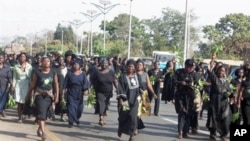Nigeria's government says continuing religious and ethnic violence in central regions will not disrupt nationwide elections in April. At least 200 people have died in that violence, in the last month.
Most of the violence is centered on the Plateau State capital, Jos, where rival gangs of Christian and Muslim youths have engaged in revenge attacks since Christmas Eve bombings that killed 80 people and wounded more than 100 others.
Much of the tension in what is known as Nigeria's "Middle Belt" comes from land disputes between mostly-Christian farmers and predominantly-Muslim pastoralists. That hostility has been exacerbated by a radical Muslim group, known as Boko Haram, that says it is fighting for the creation of an Islamic state in northern Nigeria.
But last week's assassination of a leading gubernatorial candidate in Borno State has raised concerns that the previously-localized violence could undermine nationwide elections in April.
President Goodluck Jonathan's government has moved quickly to try to reassure voters and candidates that the elections will be secure.
"I can assure you that, by the grace of God, April elections will be peaceful," said
Humphrey Abbah, Nigeria's minister of police affairs.
Abbah says the government understands the problem and is moving to contain it. "There are challenges that have come up, and we are up to the task,” Abbah explains. “You should realize that government has the capacity to contain it. And, we are going to contain it."
Abbah will not say what actions security officials are planning. "Security measures to combat these things cannot be said on televisions and radios. That is why they remain security ways of handling it. We are tackling it. It will soon be over," he said.
Civil society leaders in Plateau State say one of the reasons for the recent insecurity appears to be the rotation of troops in a special military task force. Brigadier General Hassan Umaru, who commands that task force, says the rotation will be complete by the end of this week.
"I just want to use this opportunity to ask the people to be patient with us because we have a large turnout of people coming in to replace the present ones on the ground," he said.
The local Red Cross has been helping to treat people injured during the violence and is improving conditions at centers for displaced civilians in case their numbers grow, as the elections approach.
"In Jos, we do have an office where we are now launching water and sanitation programs that will concentrate in schools that are places where people will flee when there is violence in their region. So we do want to have structures that will be ready to receive these people if they have to flee because of the violence," said Zoran Jovanovich, the head of the Red Cross delegation in the capital, Abuja.
Jovanovic says the Red Cross continues to work freely, despite considerable religious tension in Jos. "Sometimes even the police will hesitate to deploy Muslim officers in Christian neighborhoods or vice versa. I think the fact that we do have a very good branch of the Red Cross has helped us so far to be able to work more or less normally,” he said. “But it is obvious that in a time of tension, any movement in Jos town is very difficult and can be very dangerous."
The Jonathan government says some of its new anti-terrorism measures include closer inspections of police-licensed armories, the installation of more closed-circuit televisions to monitor public places and stepped-up security around political events to deter electoral violence.
Nigerian Leaders Say Jos Violence Will Not Disrupt April Vote




